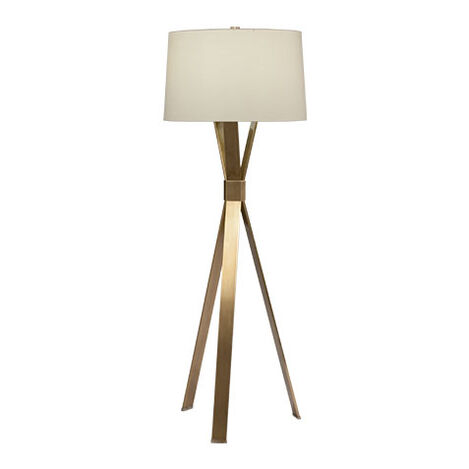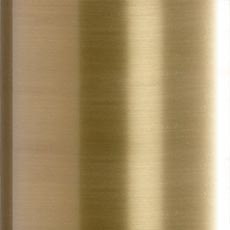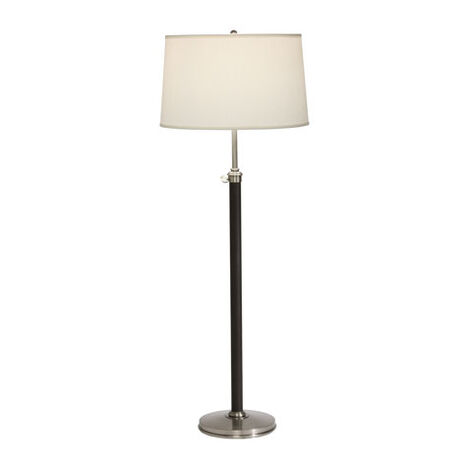Designer FAQs: Floor Lamps for Living Room and More
What kinds of floor lamps are there?
Here are some of the floor lamp types we sell:
- Club floor lamp: The most ubiquitous type of floor lamp consists of a post topped by a shade. Post design can range from the tapered metal simplicity of our Braxton floor lamp to the maximalist ring design of our Owen floor lamp.
- Tripod floor lamp: Instead of a post, a tripod lamp has a—you guessed it—tripod base. Go classic with a wood base, like our Surveyor’s floor lamp, or industrial with our iron Milania floor lamp.
- Cantilever floor lamp: This lamp has an angled arm that adjusts upward and downward. Our Jesse task floor lamp is a great example.
- Pharmacy floor lamp: Lamps like our Wesley pharmacy floor lamp have the classic slender horizontal shade and tall post of a pharmacy lamp. You can usually adjust their height and, in some cases, the position of their shade.
- Adjustable floor lamp: Also called articulating lamps, adjustable floor have joints that allow the shade position to adjust horizontally. Our Tiberius floor lamp is one of these.
How do you use a floor lamp in décor?
Most floor lamps have a metal finish somewhere, so it’s important to consider them in the context of other metal finishes.
- If you prefer a uniform look, purchase a floor lamp with a finish that coordinates with other metals in your space.
- If you like contrast, pick something different; for example, a gold-leafed floor lamp adds a splash of glamour to a room that has mostly black or oil-rubbed bronze metal finishes.
Also consider whether your space is in dire need of a statement piece or whether your lamp can function more in the background. You can also pick something like a tray-table lamp if you need a dual-purpose light and tabletop surface.
Want to preview your floor lamp in your space? Try our EA inHome® app.
Where would you place a floor lamp?
Floor lamps can go anywhere, depending on what you’re using them for and the amount of space you have. Our designers use floor lamps to create three different types of light within a room:
- Ambient light: Club lamps with a thin post and a shade are great choices for diffusing ambient light around a room. They can go in any corner or against any unused wall, but make sure you have enough room to accommodate the width of the lamp’s shade and base.
- Area light: When you want to highlight a particular area of a room, like a gallery wall or floor sculpture, place a standing lamp next to it. You can either angle it toward the piece or go with a floor lamp that spreads a diffuse glow over the wall.
- Task light: Lamps with adjustable arms, or with lights that point downward, can be placed right next to a chair or sofa to keep things bright when you’re reading or knitting—or playing games on your phone!
Floor lamps can be great space savers in small bedrooms—no room for a night table? Place a floor lamp next to the bed. They can also be placed next to a decorative accent table that’s too small to support a table lamp.
One tip: When you place a floor lamp, leave some negative space around it rather that positioning it right against a wall or against your seating. This negative space helps you get the most from your floor lamp—ambient light isn’t absorbed by a wall, and task lighting isn’t right on top of you, creating glare and shadows while you’re trying to work.
How big should a floor lamp be?
We size our floor lamps between 55 and 60 inches in height, with some lamps that adjust to taller than 5 feet. Check the shade and base diameter to make sure they’ll fit within the allotted space—again, allowing for a foot or so of negative space around the lamp.
For more tips on selecting light fixtures, check out our read our lighting buying guide.
What kind of bulb should a floor lamp use? Do you sell LED floor lamps?
All of our floor lamps can utilize energy-efficient LED bulbs. We think about floor lamp bulbs in two terms: brightness and color temperature. A bulb’s brightness is measured in lumens; a bulb’s color temperature, or how cool or warm the light appears to be, is measured in Kelvin (K).
- The higher the number of lumens, the brighter the bulb.
- Lower K indicates warmer—more red than blue—light, while higher K indicates a cooler, bluer color temperature.
When using floor lamps for ambient light in living rooms, dining rooms, or bedrooms, we estimate your total ambient light needs to be between 10 and 20 lumens per square foot; in a 100-square-foot room, that’s between 1,000 and 2,000 lumens, depending on your personal preference. If you have additional ambient light sources contributing toward that total, your floor lamp bulb won’t need to be as bright. If your floor lamp is one of your only ambient light sources, you’ll need a brighter bulb. People also tend to prefer warm light in living rooms, dining rooms, and bedrooms, so choose a bulb between 2,700 K and 3,500 K.
For area lighting, such as when you’re illuminating a piece of artwork, stick with warmer light. If you’re placing a club lamp near your artwork to bathe it in diffuse light, shoot for about 800 lumens. For a floor lamp that you’re using for task light, opt for a 450-lumen bulb.
Do you have more questions? Click the Designer Chat icon, or contact your local Design Center—we’re happy to help!























































